Financial Management: Annuity, Loan Calculations, and Investments
VerifiedAdded on 2023/06/07
|7
|709
|52
Homework Assignment
AI Summary
This financial management assignment solution includes calculations and analysis related to annuities, loan repayments (EMI), and investment decisions. It covers future and present value of annuities, EMI calculations for loans, and investment appraisal using Net Present Value (NPV). Specifically, it c...
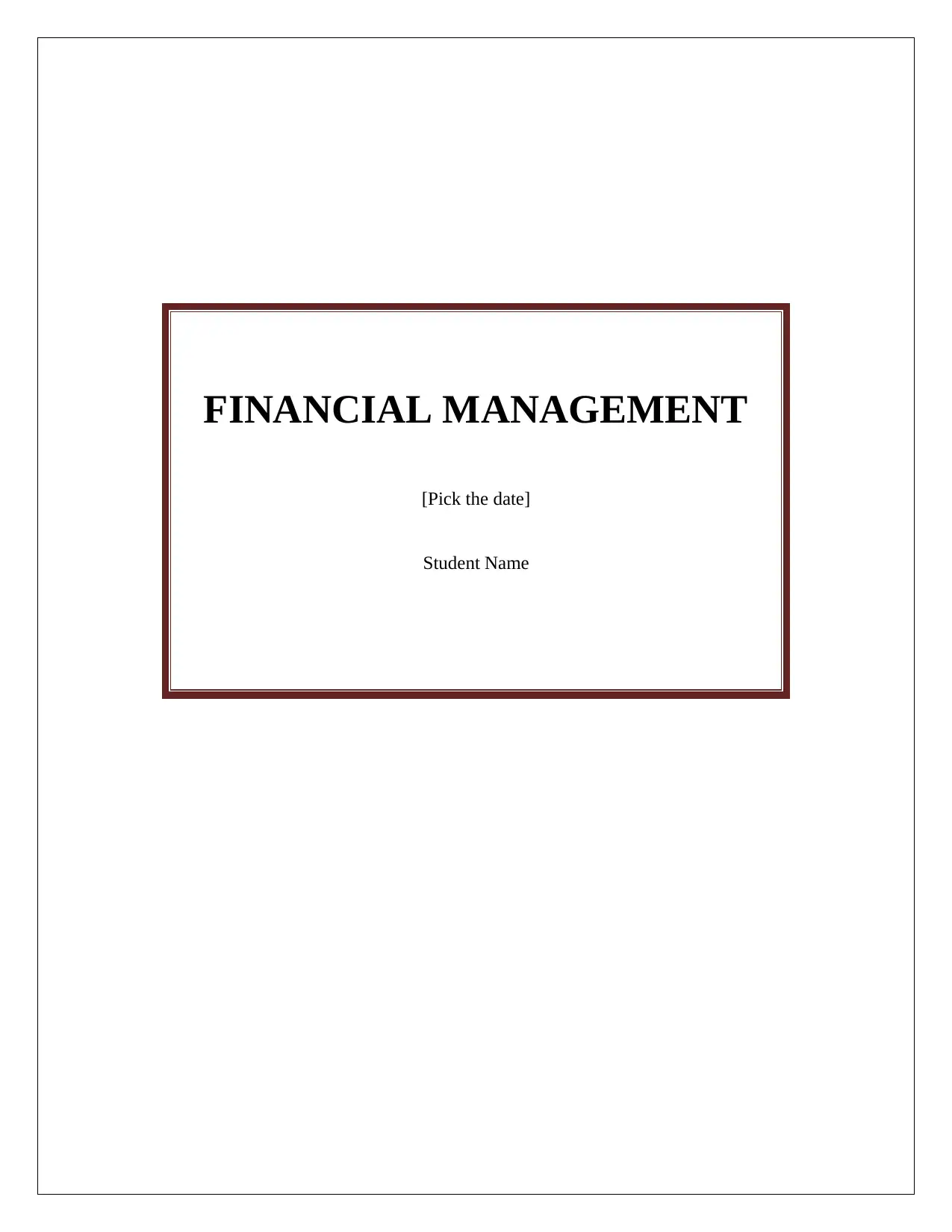
FINANCIAL MANAGEMENT
[Pick the date]
Student Name
[Pick the date]
Student Name
Paraphrase This Document
Need a fresh take? Get an instant paraphrase of this document with our AI Paraphraser
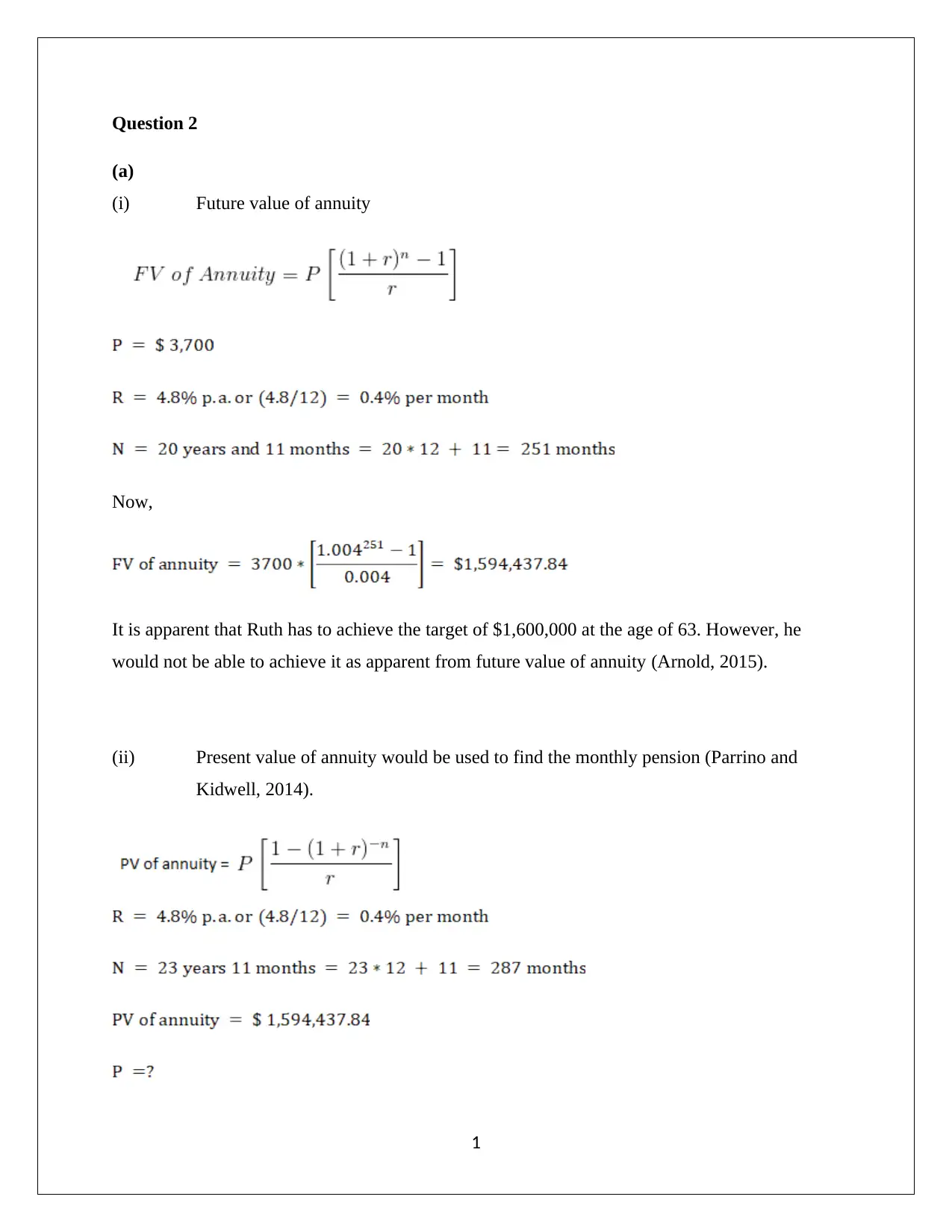
Question 2
(a)
(i) Future value of annuity
Now,
It is apparent that Ruth has to achieve the target of $1,600,000 at the age of 63. However, he
would not be able to achieve it as apparent from future value of annuity (Arnold, 2015).
(ii) Present value of annuity would be used to find the monthly pension (Parrino and
Kidwell, 2014).
1
(a)
(i) Future value of annuity
Now,
It is apparent that Ruth has to achieve the target of $1,600,000 at the age of 63. However, he
would not be able to achieve it as apparent from future value of annuity (Arnold, 2015).
(ii) Present value of annuity would be used to find the monthly pension (Parrino and
Kidwell, 2014).
1
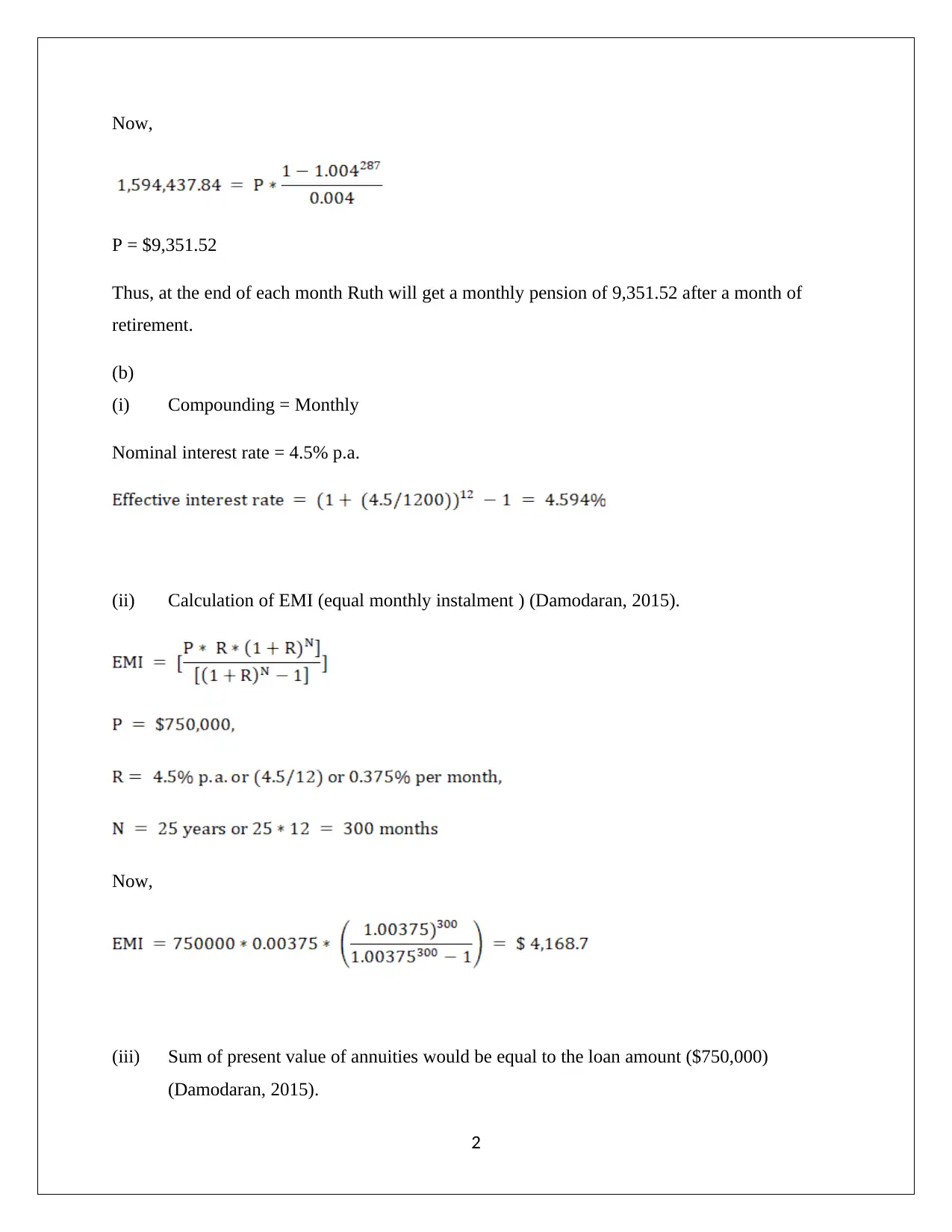
Now,
P = $9,351.52
Thus, at the end of each month Ruth will get a monthly pension of 9,351.52 after a month of
retirement.
(b)
(i) Compounding = Monthly
Nominal interest rate = 4.5% p.a.
(ii) Calculation of EMI (equal monthly instalment ) (Damodaran, 2015).
Now,
(iii) Sum of present value of annuities would be equal to the loan amount ($750,000)
(Damodaran, 2015).
2
P = $9,351.52
Thus, at the end of each month Ruth will get a monthly pension of 9,351.52 after a month of
retirement.
(b)
(i) Compounding = Monthly
Nominal interest rate = 4.5% p.a.
(ii) Calculation of EMI (equal monthly instalment ) (Damodaran, 2015).
Now,
(iii) Sum of present value of annuities would be equal to the loan amount ($750,000)
(Damodaran, 2015).
2
⊘ This is a preview!⊘
Do you want full access?
Subscribe today to unlock all pages.

Trusted by 1+ million students worldwide
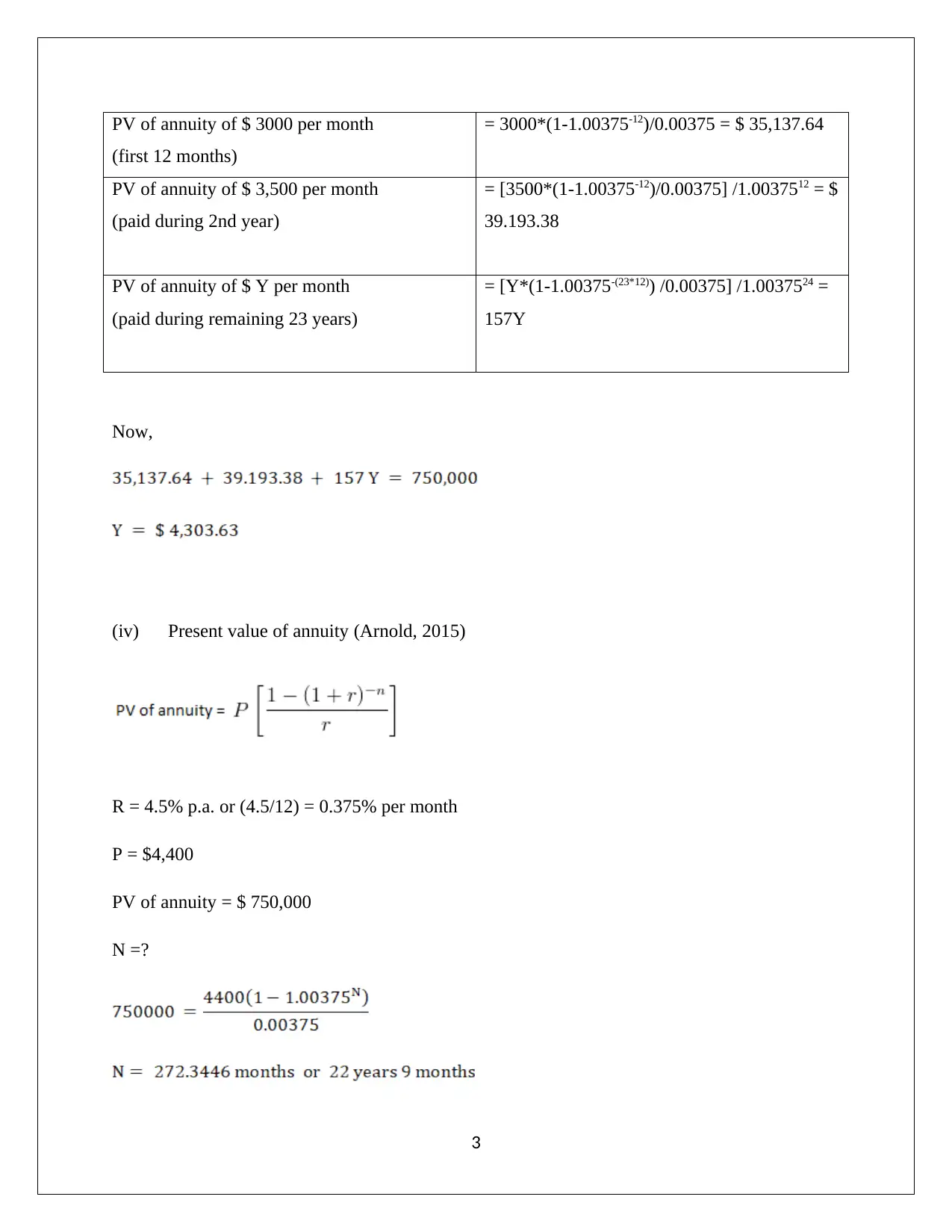
PV of annuity of $ 3000 per month
(first 12 months)
= 3000*(1-1.00375-12)/0.00375 = $ 35,137.64
PV of annuity of $ 3,500 per month
(paid during 2nd year)
= [3500*(1-1.00375-12)/0.00375] /1.0037512 = $
39.193.38
PV of annuity of $ Y per month
(paid during remaining 23 years)
= [Y*(1-1.00375-(23*12)) /0.00375] /1.0037524 =
157Y
Now,
(iv) Present value of annuity (Arnold, 2015)
R = 4.5% p.a. or (4.5/12) = 0.375% per month
P = $4,400
PV of annuity = $ 750,000
N =?
3
(first 12 months)
= 3000*(1-1.00375-12)/0.00375 = $ 35,137.64
PV of annuity of $ 3,500 per month
(paid during 2nd year)
= [3500*(1-1.00375-12)/0.00375] /1.0037512 = $
39.193.38
PV of annuity of $ Y per month
(paid during remaining 23 years)
= [Y*(1-1.00375-(23*12)) /0.00375] /1.0037524 =
157Y
Now,
(iv) Present value of annuity (Arnold, 2015)
R = 4.5% p.a. or (4.5/12) = 0.375% per month
P = $4,400
PV of annuity = $ 750,000
N =?
3
Paraphrase This Document
Need a fresh take? Get an instant paraphrase of this document with our AI Paraphraser
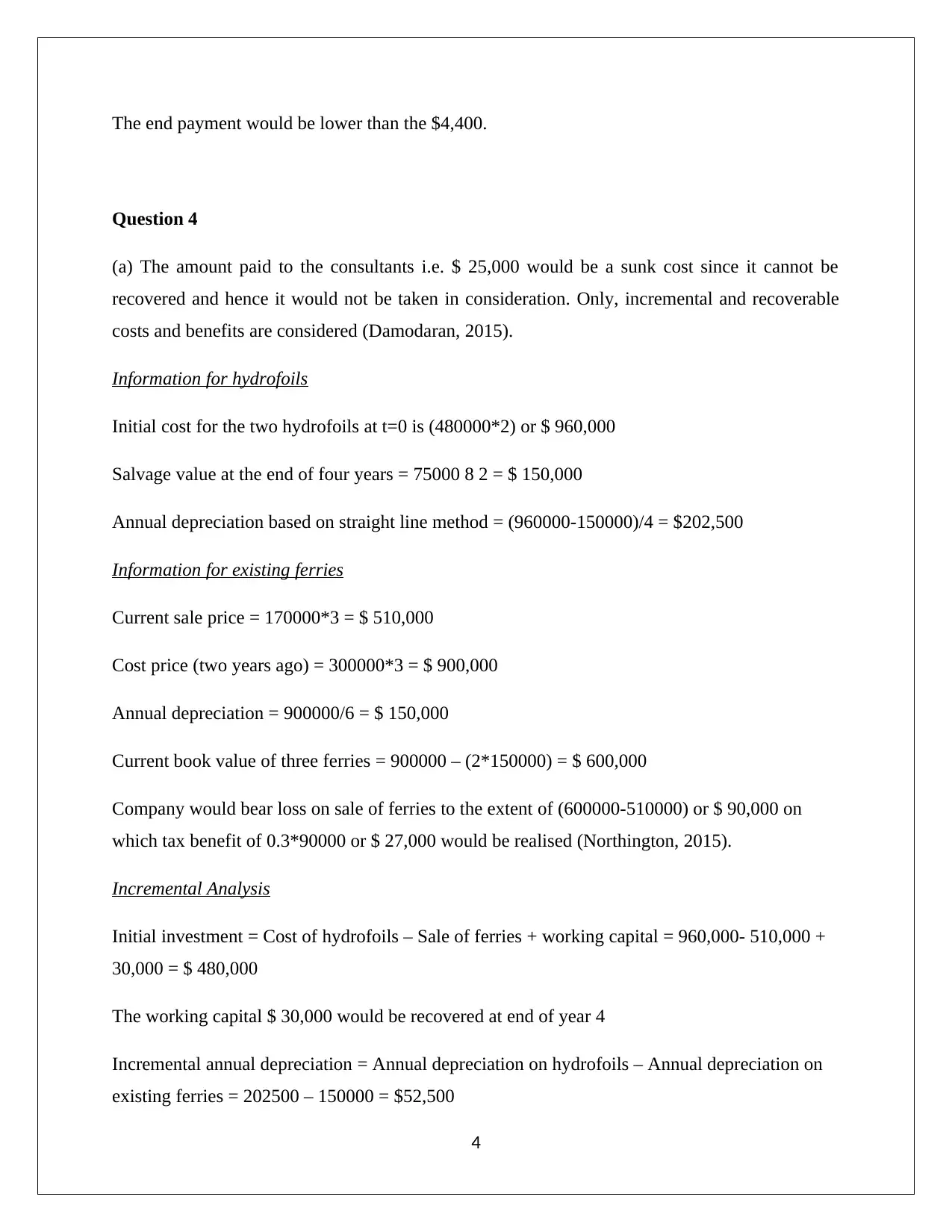
The end payment would be lower than the $4,400.
Question 4
(a) The amount paid to the consultants i.e. $ 25,000 would be a sunk cost since it cannot be
recovered and hence it would not be taken in consideration. Only, incremental and recoverable
costs and benefits are considered (Damodaran, 2015).
Information for hydrofoils
Initial cost for the two hydrofoils at t=0 is (480000*2) or $ 960,000
Salvage value at the end of four years = 75000 8 2 = $ 150,000
Annual depreciation based on straight line method = (960000-150000)/4 = $202,500
Information for existing ferries
Current sale price = 170000*3 = $ 510,000
Cost price (two years ago) = 300000*3 = $ 900,000
Annual depreciation = 900000/6 = $ 150,000
Current book value of three ferries = 900000 – (2*150000) = $ 600,000
Company would bear loss on sale of ferries to the extent of (600000-510000) or $ 90,000 on
which tax benefit of 0.3*90000 or $ 27,000 would be realised (Northington, 2015).
Incremental Analysis
Initial investment = Cost of hydrofoils – Sale of ferries + working capital = 960,000- 510,000 +
30,000 = $ 480,000
The working capital $ 30,000 would be recovered at end of year 4
Incremental annual depreciation = Annual depreciation on hydrofoils – Annual depreciation on
existing ferries = 202500 – 150000 = $52,500
4
Question 4
(a) The amount paid to the consultants i.e. $ 25,000 would be a sunk cost since it cannot be
recovered and hence it would not be taken in consideration. Only, incremental and recoverable
costs and benefits are considered (Damodaran, 2015).
Information for hydrofoils
Initial cost for the two hydrofoils at t=0 is (480000*2) or $ 960,000
Salvage value at the end of four years = 75000 8 2 = $ 150,000
Annual depreciation based on straight line method = (960000-150000)/4 = $202,500
Information for existing ferries
Current sale price = 170000*3 = $ 510,000
Cost price (two years ago) = 300000*3 = $ 900,000
Annual depreciation = 900000/6 = $ 150,000
Current book value of three ferries = 900000 – (2*150000) = $ 600,000
Company would bear loss on sale of ferries to the extent of (600000-510000) or $ 90,000 on
which tax benefit of 0.3*90000 or $ 27,000 would be realised (Northington, 2015).
Incremental Analysis
Initial investment = Cost of hydrofoils – Sale of ferries + working capital = 960,000- 510,000 +
30,000 = $ 480,000
The working capital $ 30,000 would be recovered at end of year 4
Incremental annual depreciation = Annual depreciation on hydrofoils – Annual depreciation on
existing ferries = 202500 – 150000 = $52,500
4
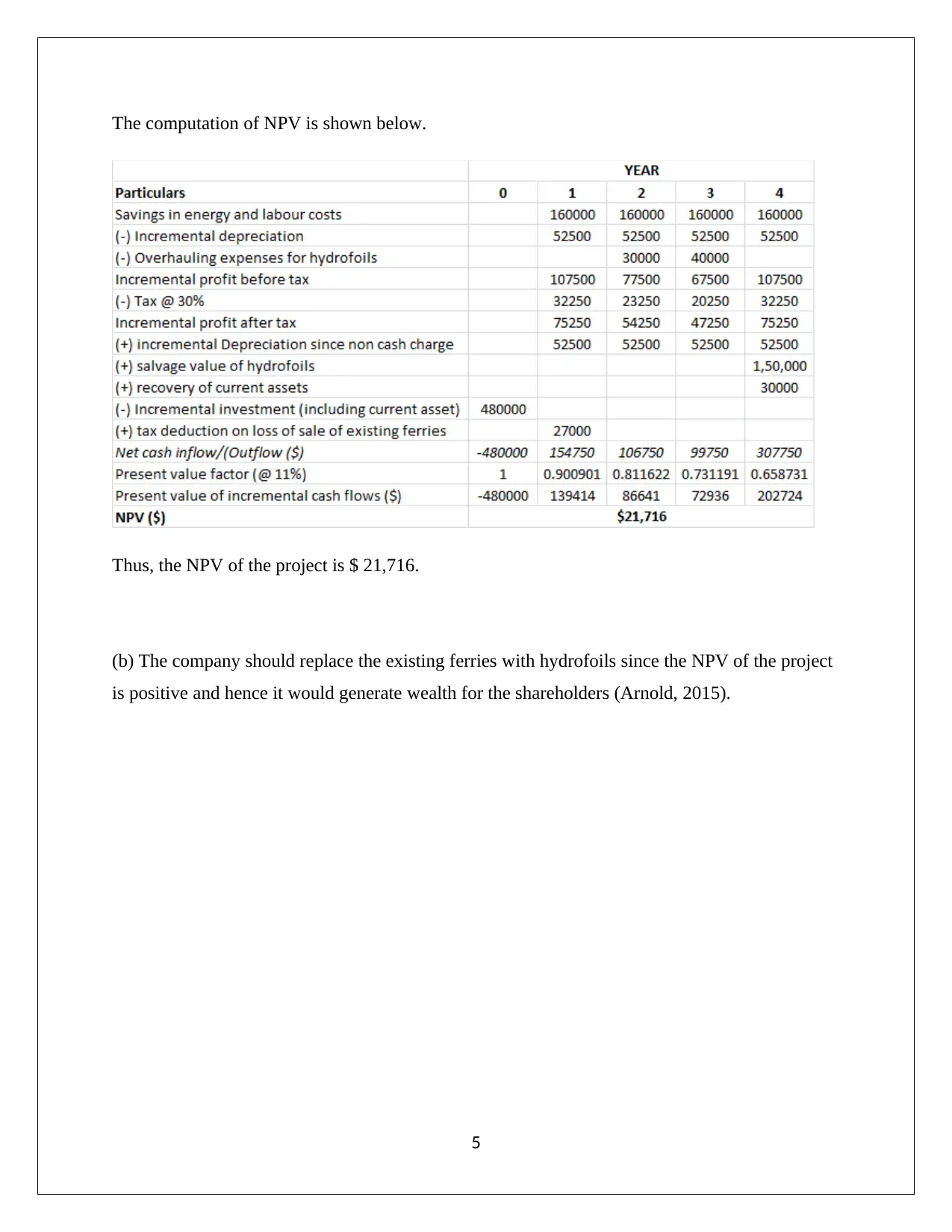
The computation of NPV is shown below.
Thus, the NPV of the project is $ 21,716.
(b) The company should replace the existing ferries with hydrofoils since the NPV of the project
is positive and hence it would generate wealth for the shareholders (Arnold, 2015).
5
Thus, the NPV of the project is $ 21,716.
(b) The company should replace the existing ferries with hydrofoils since the NPV of the project
is positive and hence it would generate wealth for the shareholders (Arnold, 2015).
5
⊘ This is a preview!⊘
Do you want full access?
Subscribe today to unlock all pages.

Trusted by 1+ million students worldwide
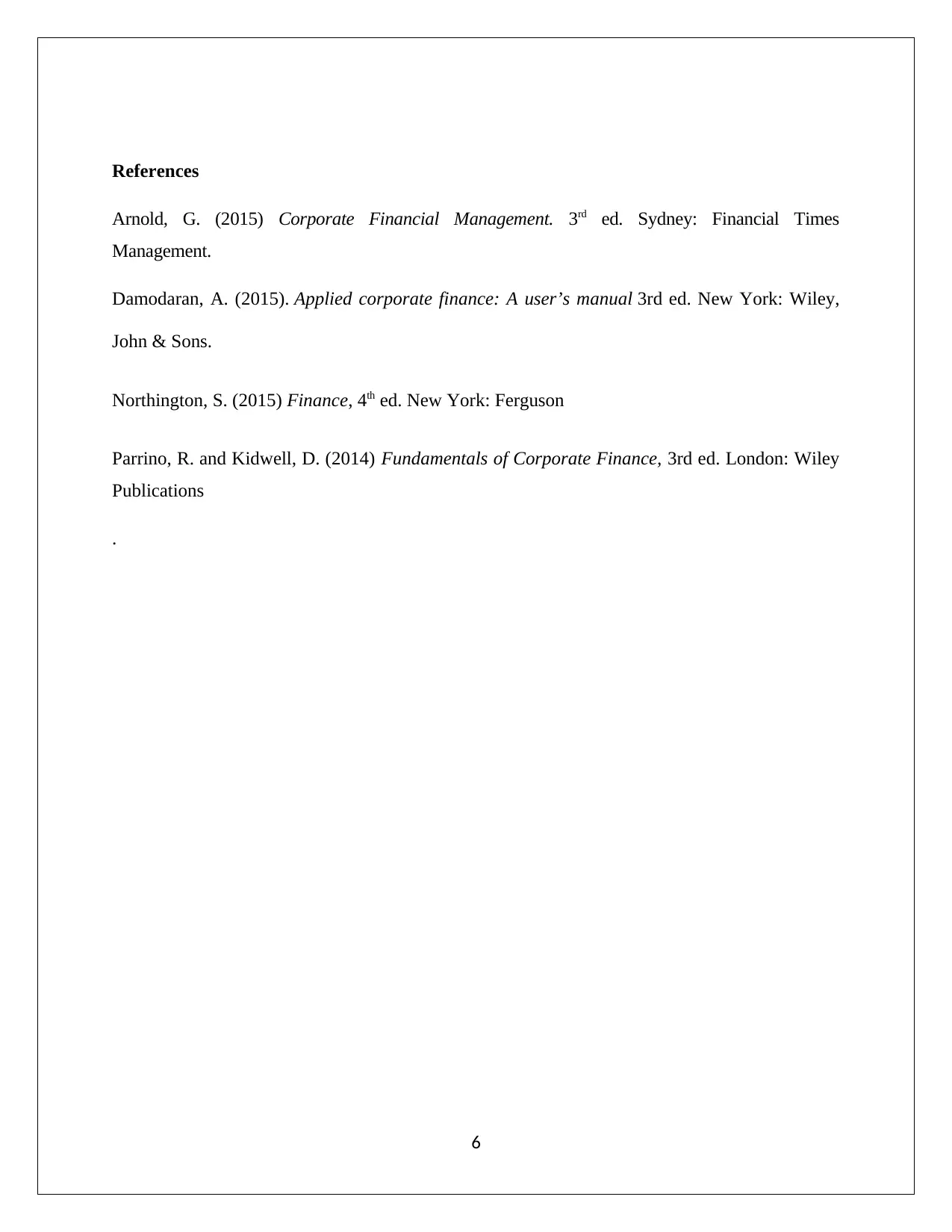
References
Arnold, G. (2015) Corporate Financial Management. 3rd ed. Sydney: Financial Times
Management.
Damodaran, A. (2015). Applied corporate finance: A user’s manual 3rd ed. New York: Wiley,
John & Sons.
Northington, S. (2015) Finance, 4th ed. New York: Ferguson
Parrino, R. and Kidwell, D. (2014) Fundamentals of Corporate Finance, 3rd ed. London: Wiley
Publications
.
6
Arnold, G. (2015) Corporate Financial Management. 3rd ed. Sydney: Financial Times
Management.
Damodaran, A. (2015). Applied corporate finance: A user’s manual 3rd ed. New York: Wiley,
John & Sons.
Northington, S. (2015) Finance, 4th ed. New York: Ferguson
Parrino, R. and Kidwell, D. (2014) Fundamentals of Corporate Finance, 3rd ed. London: Wiley
Publications
.
6
1 out of 7
Your All-in-One AI-Powered Toolkit for Academic Success.
+13062052269
info@desklib.com
Available 24*7 on WhatsApp / Email
![[object Object]](/_next/static/media/star-bottom.7253800d.svg)
Unlock your academic potential
© 2024 | Zucol Services PVT LTD | All rights reserved.
